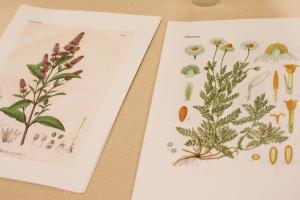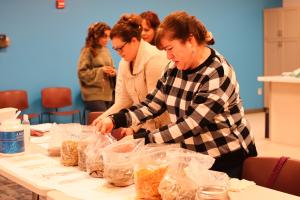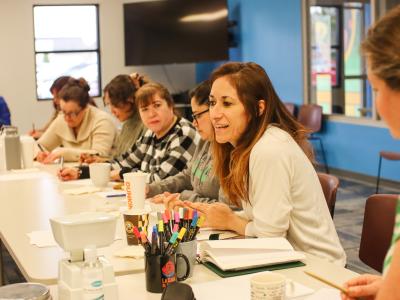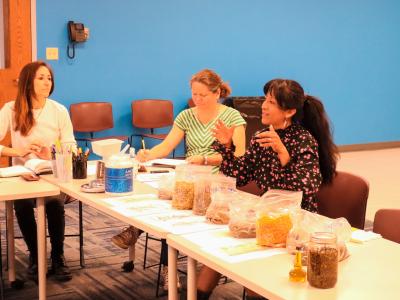Cafecitos Nurture Conversations About Motherhood
GRC Funding Supports "The Latinx Obstetric Violence Project"


All photos by Jocelyn Morales
At La Casa de Amistad in South Bend, Indiana, large plastic bags of dried herbs labeled in blue permanent marker were placed on two tables. Women lined up, scooping combinations of herbs into small floral-patterned mesh bags. A row of papers with botanical illustrations were displayed in front of their real-life counterparts. Everyone sat down at the white folding tables, facing each other in a semicircle. Then the conversation began.
Guided by a facilitator, women shared their personal connections to these herbs. Some had distinct childhood memories of their mothers and grandmothers caring for them when they were sick. Others shared how the scent of the herbs reminded them of cobijo, conjuring feelings of shelter and protection. A few women expressed regret for not having any memories, which they attributed to migrating to the United States at a young age. As the conversation continued, the women shared their collective knowledge of how these plants were cultivated and used for medicinal, cooking, or healing practices.

This event, “Herbs and Motherhood Memories,” was hosted by “The Latinx Obstetric Violence Project: Art and Literature as Tools of Reciprocal and Redistributive Knowledge.” This Humanities Without Walls Grand Research Challenge-funded project, supported by the Mellon Foundation, addresses the overlooked reality of obstetric violence through art and literature workshops—cafecitos (little coffees)—that bring together women, artists, and scholars. This project is a collaboration between the University of Notre Dame and La Casa de Amistad, a non-profit educational organization working with the South Bend Latinx community.
Vania Smith-Oka (professor in the Department of Anthropology, Notre Dame) and Vanesa Miseres (associate professor of Spanish in the Department of Romance Languages and Literatures, Notre Dame) facilitate this interdisciplinary project. Their research partnership was born out of a desire to use art and literature to enhance conversations around obstetric violence in their local community. While they established the structure of this event series, including working with La Casa to provide a recurring meeting location, Smith-Oka and Miseres found that the women attending the cafecitos took ownership of the space in an organic way. They offered practical suggestions that addressed the emerging needs of their diverse group who all identified as Latinx. Over time, the women attending cafecitos found commonalities in their motherhood journeys, namely, how they have been perceived by external audiences.

“All of [the] women come with their own beliefs on how pregnancy is,” Miseres said. “All of these practices are kind of neglected when they go to see a doctor in the U.S. and [their perspectives] are devalued. Even those who have American husbands, they say [to their partners], ‘Oh, that’s witchcraft.’”
Smith-Oka agreed. “From the first day, they spoke about their motherhood being devalued in white spaces, whether it was [with] doctors or legal spaces or educational spaces,” Smith-Oka said. “They have seemed really empowered in a way to talk about their own beliefs—even if they are contradictory.”
These seemingly contradictory beliefs about sexuality, motherhood, feminism all converged into questions of identity: To whom does my body belong? Can I be a sexual being and also a mother? How can I talk to my daughters about their bodies? The cafecitos have provided a space to question, to hold contradicting beliefs against outdated narratives, to share knowledge with others, and to create new stories.
“The idea of being able to tell a story—it’s a very common thing, but this participant who collaborates with us and works at La Casa said, ‘There are so many women who come here because they cannot talk [about this] at home,’” Miseres observed. “They value storytelling and having a narrative about themselves.”
Published on August 7, 2023